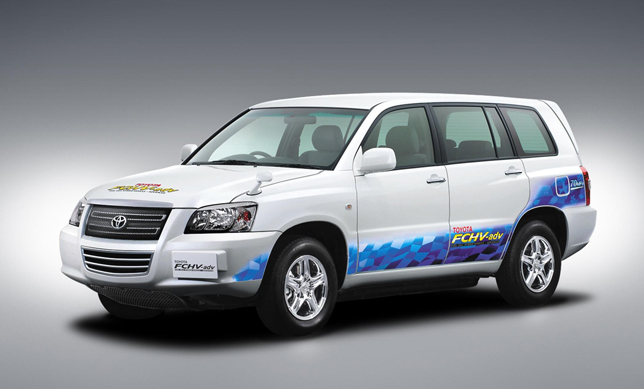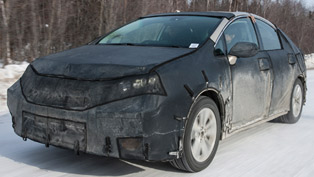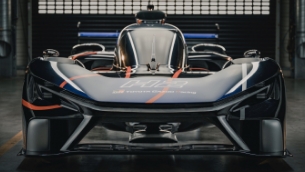Toyota develops new fuel cell hybrid with improved cruising distance of more than 500 miles
Toyota has developed a new fuel cell hybrid vehicle that travels more than double the distance of its predecessor model, increasing the maximum cruising range from 205 miles to 515 miles. Limited cruising ranges of previous fuel cell systems presented obstacles to widespread fuel cell vehicle use but the ‘Toyota FCHV-adv' (fuel cell hybrid vehicle-advanced) improves the cruising range with its newly designed high-performance Toyota FC Stack.Fuel efficiency was improved by 25 per cent through improving fuel cell unit performance, enhancing the regenerative brake system and reducing energy consumed by the auxiliary system. Further changes include incorporating degradation control for the electrode catalyst and improving fuel cell durability. Furthermore, equipping the vehicle with Toyota-developed high-pressure hydrogen tanks makes it possible to travel approximately 515 miles* on a single fuelling — performance that more than doubles that of the Toyota FCHV-adv's predecessor, the Toyota FCHV.
 The Toyota FCHV-adv also deals with the low-temperature start issues typically associated with fuel cell vehicles.
The building block of the Toyota FC Stack is the Membrane Electrode Assembly (MEA), where engineers focused on the basic problem of internally produced water interfering with electrical generation within the MEA at low temperatures.
Research was carried out to understand the behaviour and amount of water generated in the fuel cell, allowing engineers to optimise the MEA design to improve low-temperature start-up.
As a result, the Toyota FCHV-adv can start and operate in cold regions at temperatures as low as –30 degrees Celsius, meaning the vehicle can be used in a wider variety of conditions and climates.
While steadily conducting research and development to resolve issues such as how to improve the durability and reduce costs of the Toyota FC Stack, Toyota is working with government, energy companies and other concerned parties to actively bring about widespread fuel cell vehicle use.
The Toyota FCHV-adv acquired vehicle-type certification from Japan's Ministry of Land, Infrastructure and Transport (MLIT) on June 3.
*10-15 test cycle, Toyota calculations
Vehicle Specifications
The Toyota FCHV-adv also deals with the low-temperature start issues typically associated with fuel cell vehicles.
The building block of the Toyota FC Stack is the Membrane Electrode Assembly (MEA), where engineers focused on the basic problem of internally produced water interfering with electrical generation within the MEA at low temperatures.
Research was carried out to understand the behaviour and amount of water generated in the fuel cell, allowing engineers to optimise the MEA design to improve low-temperature start-up.
As a result, the Toyota FCHV-adv can start and operate in cold regions at temperatures as low as –30 degrees Celsius, meaning the vehicle can be used in a wider variety of conditions and climates.
While steadily conducting research and development to resolve issues such as how to improve the durability and reduce costs of the Toyota FC Stack, Toyota is working with government, energy companies and other concerned parties to actively bring about widespread fuel cell vehicle use.
The Toyota FCHV-adv acquired vehicle-type certification from Japan's Ministry of Land, Infrastructure and Transport (MLIT) on June 3.
*10-15 test cycle, Toyota calculations
Vehicle Specifications
| Vehicle | TOYOTA FCHV-adv | TOYOTA FCHV | |
| Overall length/width/height (mm) | 4,735/1,815/1,685 | 4,735/1,815/1,685 | |
| Weight (kg) | 1,880 | 1,880 | |
| Seating capacity | 5 | 5 | |
| Maximum cruising range (km)* 10-15 test cycle/JC08 test cycle | Approx. 830/Approx. 760 | Approx. 330(10-15 test cycle) | |
| Maximum speed (km/h) | 155 | 155 | |
| Fuel cell | Name | Toyota FC Stack | Toyota FC Stack |
| Type | Polymer electrolyte | Polymer electrolyte | |
| Output (kW) | 90 | 90 | |
| Motor | Type | Permanent magnet | Permanent magnet |
|
Maximum output in kW (ps) |
90 (122) | 90 (122) | |
|
Maximum torque in N-m (kg-m) |
260 (26.5) | 260 (26.5) | |
| Fuel | Hydrogen | Hydrogen | |
| Storage system | High-pressure storage tanks | High-pressure storage tanks | |
|
Maximum storage pressure (MPa) |
70 | 35 | |
| Tank capacity (L) | 156 | 148 | |
| Battery | Nickel-metal hydride | Nickel-metal hydride | |
*As based on TMC calculations










